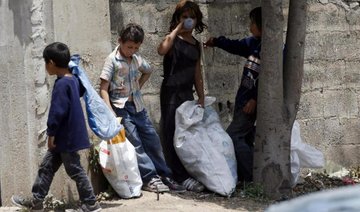AZRAQ REFUGEE CAMP, Jordan: A job center opened Sunday in Jordan’s second largest camp for Syrian refugees, the latest sign of an EU-backed policy shift meant to improve the lives of the displaced in regional host countries and discourage them from migrating onward.
Dozens of refugees crowded around long tables in a community center in the Azraq camp to register with potential employers for jobs in factories and on farms.
“Any work is OK for me,” said Sumaya Mohammed Jidaa, a 39-year-old widow and mother of six inquiring about a sewing job. “Just give us money to take care of our children.”
Under the so-called Jordan Compact, a deal struck with donor countries in 2016, the kingdom promised to provide 200,000 work permits for Syrians over three years, in exchange for several billion dollars in development assistance and reduced tariff barriers on Jordanian exports to Europe.
Implementation has been slow because of Jordan’s economic downturn, high unemployment and the slow pace of regulatory change. About 90,000 Syrians have obtained work permits so far, and only two factories are exporting goods to Europe under the new rules, officials said.
“You cannot expect the private sector to simply make use of a trade agreement if the proper support is not being provided,” said Patrick Daru, country coordinator of the International Labor Organization.
The job center is a project of the ILO, the UN refugee agency and Jordan’s Labor Ministry.
Jordan has been struggling with the fallout from prolonged conflict in neighboring Syria and Iraq, leading to unemployment of about 18 percent, with twice that rate among the young.
At the same time, the kingdom has more than 300,000 registered foreign workers and up to one million unregistered ones, according to the Ministry of Labor. Most are Egyptian and South Asian migrants in low-skilled jobs like domestic care, construction and agriculture.
The government has attempted labor reform, but many Jordanians disparage the manual labor traditionally performed by migrant workers, leaving a gap that Syrian refugees may now partially fill.
Job creation is Jordan’s central problem, Daru said.
“It’s a problem of investment. It’s a problem of getting European companies to source from Jordan, and this is the main game-changer,” he said.
At the job fair, Emad Hussein offered jobs for up to 100 refugees, hoping that by hiring them his textiles company will become eligible for reduced European tariffs. Hussein said he currently employs 700 Jordanians, 1,700 South Asians and two refugees.
“It’s less expensive to hire Syrians because we don’t have to pay meals and accommodations for them,” he said. “Even if there’s no European customers, we still need Syrians. We have to help people because of humanity, and we know they have experience.”
The job center, supported in part by the Dutch Embassy, contributes to the goal of keeping refugees as close to home as possible, said Dutch Ambassador Barbara Jozaisse.
“At least people now can apply for a job and earn their own income, so you have some dignity, you have pride, you have income, you can continue building your life and developing yourself and your family,” she said.
The Syria conflict, which erupted in 2011, has displaced millions of people, including some 5.5 million who fled civil war in their homeland. Jordan hosts about 660,000 registered Syrian refugees, though Jordanian authorities say the actual number of Syrians in the country is twice as high.
Job center for Syrians opens in Jordan refugee camp
Job center for Syrians opens in Jordan refugee camp

Israeli strikes hit Yemen’s Sanaa and Hodeidah, Houthis’ Al Masirah TV says

- Houthis said that multiple air raids targeted an airport, military air base and a power station in Yemen
JERUSALEM: Multiple air raids hit several targets in Houthi-held areas of Yemen on Thursday, witnesses and the militia said, with their media saying Israel launched the strikes.
Sanaa airport and the adjacent Al-Dailami base were targeted along with a power station in Hodeida, in attacks that the Houthis’ Al-Masirah TV channel called “Israeli aggression.”
There was no immediate comment from Israel on the strikes, which come a day after Yemen fired a ballistic missile and two drones at Israel.
On Saturday, a Houthi missile attack left 16 people wounded in Tel Aviv.
Saturday’s incident had prompted a warning from Israeli Prime Minister Benjamin Netanyahu, who said he had ordered the destruction of Houthi infrastructure.
“I have instructed our forces to destroy the infrastructure of Houthis because anyone who tries to harm us will be struck with full force,” Netanyahu said in parliament.
“We will continue to crush the forces of evil with strength and ingenuity, even if it takes time.”
Syria authorities say torched 1 million captagon pills

DAMASCUS: Syria’s new authorities torched a large stockpile of drugs on Wednesday, two security officials told AFP, including one million pills of captagon, whose industrial-scale production flourished under ousted president Bashar Assad.
Captagon is a banned amphetamine-like stimulant that became Syria’s largest export during the country’s more than 13-year civil war, effectively turning it into a narco state under Assad.
“We found a large quantity of captagon, around one million pills,” said a balaclava-wearing member of the security forces, who asked to be identified only by his first name, Osama, and whose khaki uniform bore a “public security” patch.
An AFP journalist saw forces pour fuel over and set fire to a cache of cannabis, the painkiller tramadol, and around 50 bags of pink and yellow captagon pills in a security compound formerly belonging to Assad’s forces in the capital’s Kafr Sousa district.
Captagon has flooded the black market across the region in recent years, with oil-rich Saudi Arabia a major destination.
“The security forces of the new government discovered a drug warehouse as they were inspecting the security quarter,” said another member of the security forces, who identified himself as Hamza.
Authorities destroyed the stocks of alcohol, cannabis, captagon and hashish in order to “protect Syrian society” and “cut off smuggling routes used by Assad family businesses,” he added.
Syria’s new Islamist rulers have yet to spell out their policy on alcohol, which has long been widely available in the country.
Since an Islamist-led rebel alliance toppled Assad on December 8 after a lightning offensive, Syria’s new authorities have said massive quantities of captagon have been found in former government sites around the country, including security branches.
AFP journalists in Syria have seen fighters from Islamist group Hayat Tahrir Al-Sham (HTS) set fire to what they said were stashes of captagon found at facilities once operated by Assad’s forces.
Security force member Hamza confirmed Wednesday that “this is not the first initiative of its kind — the security services, in a number of locations, have found other warehouses... and drug manufacturing sites and destroyed them in the appropriate manner.”
Maher Assad, a military commander and the brother of Bashar Assad, is widely accused of being the power behind the lucrative captagon trade.
Experts believe Syria’s former leader used the threat of drug-fueled unrest to put pressure on Arab governments.
A Saudi delegation met Syria’s new leader Ahmed Al-Sharaa in Damascus on Sunday, a source close to the government told AFP, to discuss the “Syria situation and captagon.”
Jordan in recent years has also cracked down on the smuggling of weapons and drugs including captagon along its 375-kilometer (230-mile) border with Syria.
Jordan says 18,000 Syrians returned home since Assad’s fall

AMMAN: About 18,000 Syrians have crossed into their country from Jordan since the government of Bashar Assad was toppled earlier this month, Jordanian authorities said on Thursday.
Interior Minister Mazen Al-Faraya told state TV channel Al-Mamlaka that “around 18,000 Syrians have returned to their country between the fall of the regime of Bashar Assad on December 8, 2024 until Thursday.”
He said the returnees included 2,300 refugees registered with the United Nations.
Amman says it has hosted about 1.3 million Syrians who fled their country since civil war broke out in 2011, with 650,000 formally registered with the United Nations.
Lebanon hopes for neighborly relations in first message to new Syria government

- Lebanon’s Iran-backed Hezbollah played a major part propping up Syria’s ousted President Bashar Assad through years of war
- Syria’s new Islamist de-facto leader Ahmed Al-Sharaa is seeking to establish relations with Arab and Western leaders
DUBAI: Lebanon said on Thursday it was looking forward to having the best neighborly relations with Syria, in its first official message to the new administration in Damascus.
Lebanese Foreign Minister Abdallah Bou Habib passed the message to his Syrian counterpart, Asaad Hassan Al-Shibani, in a phone call, the Lebanese Foreign Ministry said on X.
Lebanon’s Iran-backed Hezbollah played a major part propping up Syria’s ousted President Bashar Assad through years of war, before bringing its fighters back to Lebanon over the last year to fight in a bruising war with Israel – a redeployment which weakened Syrian government lines.
Under Assad, Hezbollah used Syria to bring in weapons and other military equipment from Iran, through Iraq and Syria and into Lebanon. But on Dec. 6, anti-Assad fighters seized the border with Iraq and cut off that route, and two days later, Islamist militants captured the capital Damascus.
Syria’s new Islamist de-facto leader Ahmed Al-Sharaa is seeking to establish relations with Arab and Western leaders after toppling Assad.
Iraqi intelligence chief discusses border security with new Syrian administration

BAGHDAD: An Iraqi delegation met with Syria’s new rulers in Damascus on Thursday, an Iraqi government spokesman said, the latest diplomatic outreach more than two weeks after the fall of Bashar Assad’s rule.
The delegation, led by Iraqi intelligence chief Hamid Al-Shatri, “met with the new Syrian administration,” government spokesman Bassem Al-Awadi told state media, adding that the parties discussed “the developments in the Syrian arena, and security and stability needs on the two countries’ shared border.”
















